Oberlin Alumni Magazine
Winter 2014 Vol. 108 No. 4
Thought Process
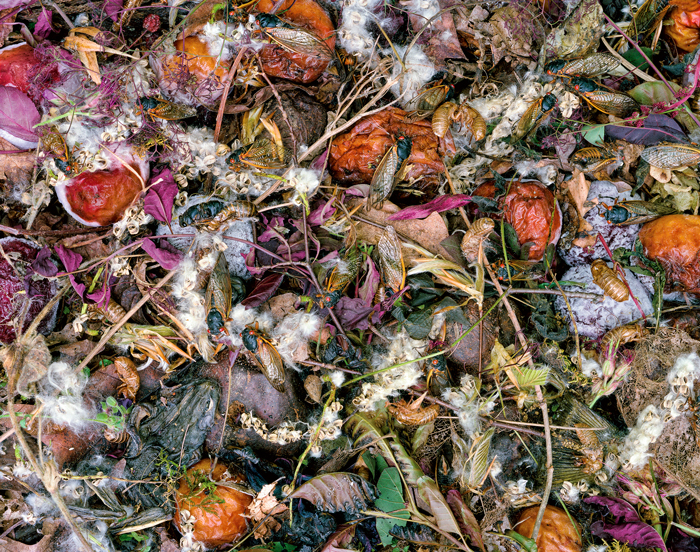
WELL-ROT WORKS
For her series, called Fallen, New York photographer Tanya Marcuse ’86 takes as subject matter the Garden of Eden after Adam and Eve’s expulsion, and as inspiration Hieronymus Bosch. The San Francisco Museum of Modern Art and the George Eastman House acquired works from Fallen for their permanent collections, and selections from the series are on view at the Brattleboro (Vt.) Museum and Art Center through June 22, 2014. For more info: www.tanyamarcuse.com
Above: Fallen No. 484, 2013. Courtesy of Julie Saul Gallery, NYC.
Bookshelf
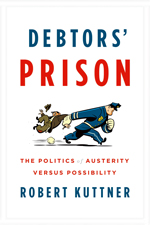
Debtors’ Prison: The Politics of Austerity Versus Possibility
Robert Kuttner ’65
ALFRED A. KNOPF, 2013
Kuttner, cofounder and coeditor of The American Prospect magazine and a distinguished senior fellow at Demos (a think tank heavy on Oberlin alumni), takes on the notion that austerity is the answer to economic turmoil abroad and at home in this, his 10th book. In fact, he argues, austerity measures will only accelerate the downward spiral of economic collapse. Reaching back to the bankruptcy of Robinson Crusoe writer Daniel Defoe 300 years ago, Kuttner shows that buttressing the little guy instead of bailing out the too-big-to-fail isn’t just a matter of compassion or politics, but of keeping the entire economy aloft. He might not change the mind of a conservative, but he’ll certainly inform the progressive’s argument against austerity.
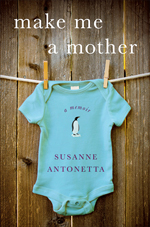
Make Me a Mother:
A Memoir
Suzanne Paola ’80,
(writing under the pen name Susanne Antonetta)
W.W. NORTON &
COMPANY, 2014
In her first memoir, the well-reviewed Body Toxic: An Environmental Memoir, Paola/Antonetta set out to document the impact on her body of the many chemicals that made their way into her New Jersey child- hood. In Make Me a Mother, she explores her adoption of a 6-month-old son from South Korea. Her line from the latter makes perfect sense: “Biology to me always smacked a little of bait-and-switch.”
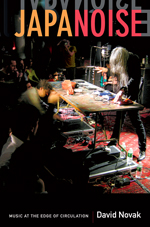
Japanoise: Music
at the Edge
of Circulation
David Novak ’92
DUKE UNIVERSITY
PRESS, 2013
An assistant professor of music at UC Santa Barbara, Novak uses years of field work in basements from Toronto to San Francisco to Osaka to piece together the story of Noise, both the underground music style and the “productive miscommunications” resulting from the dissemination of media in a highly connected world. And don’t worry: Novak still isn’t exactly sure what defines the former, either.
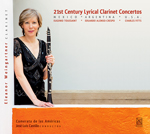
21st Century Lyrical Clarinet Concertos
Eleanor Weingartner ’83
URTEXT DIGITAL
CLASSICS, 2013
The three concertos that comprise this disc—all composed in this century, all recorded commercially for the first time—are from three different regions of the Americas. What else binds them together, according to Weingartner, is that “each displays lyrical and dramatic elements that characterize clarinet music in the first two centuries of the instrument’s existence.”
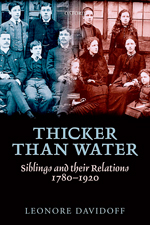
Thicker than Water:
Siblings and
their Relations, 1780-1920
Leonore Davidoff ’53
OXFORD UNIVERSITY
PRESS, 2013
The paperback edition of the 2012 book by Davidoff, emeritus professor of sociology at the University of Essex, Thicker than Water examines a relationship often neglected in scholarly studies. “They often figure in modern fiction and film,” Davidoff writes. “Yet in academic and professional analysis, siblings until recently remained an absent presence.”
Perspective
(Re)considering Career
Since the economic downturn that began in 2007, commentators have tried to make sense of how college “pays off” and which career fields are “best buys.” Boutique online college rankings, such as The Daily Beast’s “Worst Return on Investment,” exploit the public’s preoccupation with lists and rankings. Federal expectations mount for colleges to report “outcomes,” and the College Affordability and Transparency Center offers a “College Scorecard” at www.WhiteHouse.gov.
Our current students and recent graduates have grown up hearing terms like layoffs, shutdowns, downsizing, and under-employment, and they’ve been told they will be the first generation of Americans that will do less well (whatever that means) than their parents. Does such talk engender the hope they need to launch? Does it inculcate a can-do attitude and sense of self-confidence?
After observing 30 years of cynicism on the liberal arts “value proposition,” I have never seen a more opportune, if ironic, moment for it. Precisely at the moment the loudest voices are questioning its very relevance based on shallow assessments and inherently flawed analyses, this form of higher learning has never been better positioned to demonstrate and illustrate its value as our graduates enter the world.
It falls to us to reinforce the case for what Oberlin offers: an excellent liberal arts education and a world-renowned conservatory of music. It’s great that college leaders extol its virtues, but the voices we need right now are those of our students and recent graduates, as they vie to find a place in that “real world.” But there’s an intervening problem: Many are paralyzed and intimidated by the noise, the incessantly narrow messages of media, the cautionary tales they hear, and the myths and misinformation they find online about how to find their way.
How might they free themselves from this negativity? We should see this as an opportunity.
We know our students have the capacity to make their cases. We have seen the strength and hard work they bring to the college experience—their academic efforts, their performances, the amazing extra-curriculars, the principled stands they take. As a community we need to help students know the world of work, to understand the fundamental psychology of interview and selection paradigms, and be fully prepared to surmount the inherent challenges of getting hired and striking out on their own. We need to cultivate in them the ability to demonstrate their inner strength and self-confidence, and express their intellectual and emotional perspectives.
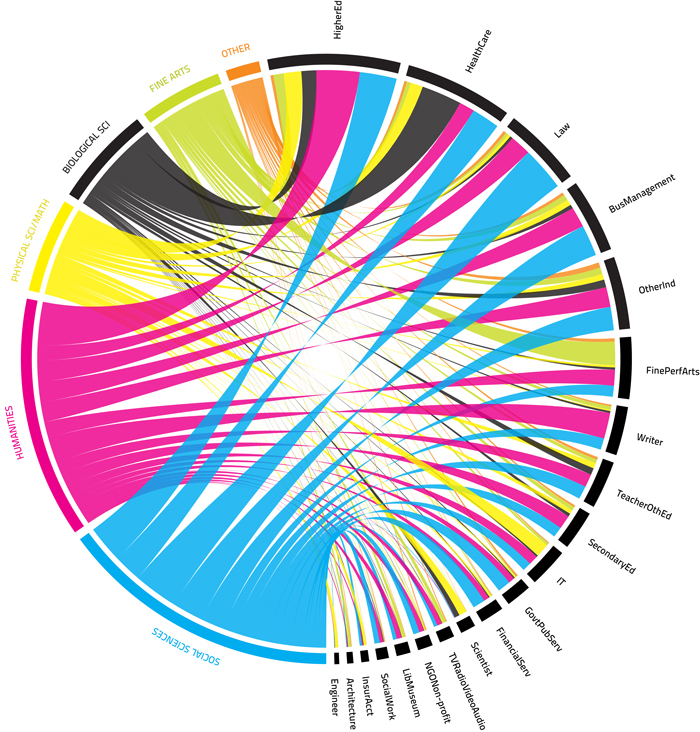
Major to Career
Pathways for
Oberlin BA Recipients, 1970-2009
Chart created by Ross Peacock, assistant vice president for institutional research and planning at Oberlin College.
Now more than ever, human resources—sometimes called “talent identification”—departments are valuing skills like flexibility, complex problem solving, adaptability, teamwork, capacity to work globally (i.e., language skills and cultural awareness), and the ability to view problems and opportunities from different perspectives. Through the preparation they undertake at Oberlin, our students can build the self-confidence they need to succeed in this new landscape.
Let me tell you what—or rather whom—you already know: the conservatory grad who is now in medical school, the English major turned astronomer, the religion major in commercial banking, the economics major heading up film projects for National Geographic, the German major cardiologist, the bassoonist as scientific writer, the studio artist leading agriculture projects for the United Nations, the philosophy major who is president of an insurance company. Obies all.
Outside the career fields that easily lend themselves to academia (such as life and physical sciences, applied mathematics, computer science, studio art, and music), Oberlin students favor cross-disciplinary, multi-disciplinary, and inter-disciplinary studies. There are the different functionss of work, and there are the varied contexts in which those functions take place: hence, the English major as managing editor for the Institute for Children, Poverty, and Homelessness.
As the graphic suggests, liberally educated graduates enter all kinds of professions from an array of majors—few straight lines, lots of curves. How many Oberlin alumni recall those 1 a.m. spirited conversations among budding economists, philosophers, music theorists, biologists, classicists, sociologists, violinists, and art historians discussing the roots of jazz, Keynesian economics, The Bluest Eye, the meaning of gender, new music, or the Flemish Renaissance? Residential liberal arts colleges foster these kinds of conversations that lead to well-rounded, curious, and intelligent graduates—and employees.
Importantly, the present national conversation about the relevance of a liberal education seems to ignore its “pure value proposition”: advancing knowledge and informing decisions and actions that will improve the human condition and our stewardship of the physical world.
How might colleges help more students explore and test themselves in the worlds of work, service, and a life of engagement?
The answer is simple: a more engaged student life. More internships, externships, “taste of industry” tours. More civic engagement, volunteerism, and campus leadership initiatives. More real-world performance opportunities. More networking, coaching, and mentoring. More entrepreneurship and venture grants. More global awareness. And we must find time to help students learn to effectively present themselves to the world of work.
Oberlin alumni have been essential to this process already, offering internships, housing, mentorship, and even just a person to call to bounce ideas off of. The college and conservatory have facilitated such contacts through programs like Oberlin Business Scholars, Cole Scholars, LaunchU, and Associate Professor of Politics Eve Sandberg’s Practicum in Applied Research. But all alumni have something to offer and might not even realize how valuable their skills and their support might be to help our students find meaningful paths in their post-Oberlin lives.
Interestingly, young alumni don’t need to change—they only need to be who they already are.
There is a way to apply, present, and interview authentically. Young alumni must operate from a positive and assertive self-view. While Oberlin places a premium on humility, our students need to step up on self- presentation. If they shake loose from the trappings of disingenuous cover letter sentences like “I believe I am the ideal candidate,” and focus their self-promotion on making sure people understand who they are, what they believe, and how much they want to be significant in an enterprise larger than themselves, the rest will take care of itself. This starts with owning their career path. And that begins with enthusiasm for what could lie ahead (even if that isn’t clear yet), an audacious goal, and a willingness to work tirelessly to get there.
As Oberlin alumnus and celebrated novelist James McBride ’79 told 40 seniors in May 2012, “Whatever you do, do it deep.”

Want to Respond?
Send us a letter-to-the-editor or leave a comment below. The comments section is to encourage lively discourse. Feel free to be spirited, but don't be abusive. The Oberlin Alumni Magazine reserves the right to delete posts it deems inappropriate.